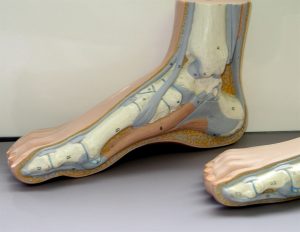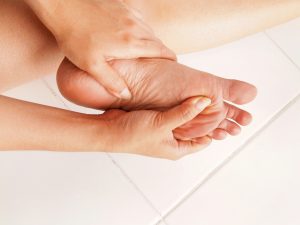Diabetic Foot Care in Pittsburgh, Bethel Park & White Oak, Pa
 As someone living with diabetes, you’re well aware of the complications that can arise concerning your feet. Neuropathy, specialized wound care, and other topics are essential knowledge for diabetics, but can be difficult to keep up with on your own.
As someone living with diabetes, you’re well aware of the complications that can arise concerning your feet. Neuropathy, specialized wound care, and other topics are essential knowledge for diabetics, but can be difficult to keep up with on your own.
That’s why the Academy of Podiatry offers a full range of services for patients seeking professional diabetic foot care. In Pittsburgh as well as White Oak, our specialists offer same-day appointments. We’re committed to providing the information, treatments, and products that can help you take better care of your feet.
Start with an Exam
The best way to glean insight into your feet’s condition is with a comprehensive exam. During your exam, a specialist will check different parts of your feet. First, we check your skin and nails for signs of infection. Then, we check your blood flow by feeling for pulses in each foot.
You may also have tests that evaluate the nerves in your feet and check for diabetic neuropathy. These include using a small wire to check sensitivity. In some cases, you may be asked to walk a short distance, which lets us check for bone, joint, and muscle problems.
Creating Your Care Program
 Based on your evaluation, a specialist from our staff will create a diabetic foot treatment or care program tailored to your needs. Your program may be as simple as starting a daily self-care routine and changing the types of shoes you wear. It could also involve treating minor foot problems, such as a corn or blister. In some cases, surgery may also be recommended to treat an infection.
Based on your evaluation, a specialist from our staff will create a diabetic foot treatment or care program tailored to your needs. Your program may be as simple as starting a daily self-care routine and changing the types of shoes you wear. It could also involve treating minor foot problems, such as a corn or blister. In some cases, surgery may also be recommended to treat an infection.
Ongoing Care is Essential
Diabetic podiatry preventative care can help keep minor nail and skin problems from worsening. There are many things you can do at home to care for your feet—for example, using lotion to moisten dry areas. However, we recommend asking your healthcare provider whether you should cut your own toenails. In some cases—especially if you have neuropathy – you may need to see a podiatrist for nail trimming.
We also recommend you seek professional care for things like corns, calluses, blisters, ulcers, and athlete’s foot. Ask your healthcare provider about your options to ensure you’re pursuing the safest and most effective treatment routes.
Wearing the Right Shoes
 Wearing the right footwear is essential to living well with diabetes. If areas of your feet have been damaged by too much pressure, your healthcare provider may recommend changing your footwear.
Wearing the right footwear is essential to living well with diabetes. If areas of your feet have been damaged by too much pressure, your healthcare provider may recommend changing your footwear.
In some cases, avoiding high heels or tight work boots may be all that’s needed. Or, your healthcare provider may recommend special diabetic shoes or custom inserts. These help protect your feet and keep existing irritations from getting worse. If you need special footwear, be sure to check whether you qualify for Medicare’s diabetic shoe program.
Contact us today to find out more about our clinics’ approach to diabetic foot care. We serve residents of Bethel Park, Pennsylvania, as well as those in White Oak and Pittsburgh.


